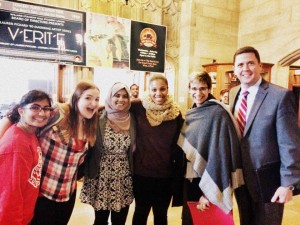Attending the Food and Brand Lab talk this week made me cognizant of our little effort humans put into eating, especially when we are tired. It was surprising to learn that in a buffet, the three items first lined up are the three items that people will fill up their plate most with. Additionally, I got an understanding of why the house dinner buffets are set up the way they are. The healthy items such as salad and vegetables appear first so that people fill up their plate with that first and with the protein left for last, they are likely to take less of it since their plate is already full with other items.
I also appreciated some of the tips given for healthier/less eating. It is recommending that junk food remain out of sight and be hidden away in cabinets or drawers. The less convenient it is to access, the better because every step required to access the junk food is a deterrent. Fruits and vegetables should be in the forefront.
A tip for eating less when eating as family for meals is to place all the vegetables and salads on the table and leave the carbs and protein items in the stove so extra effort will be required to get seconds. This way, at the end, if you still want to eat more, you’ll be more likely to just reach for the healthy food on the table than get up and the fatty items for seconds.

